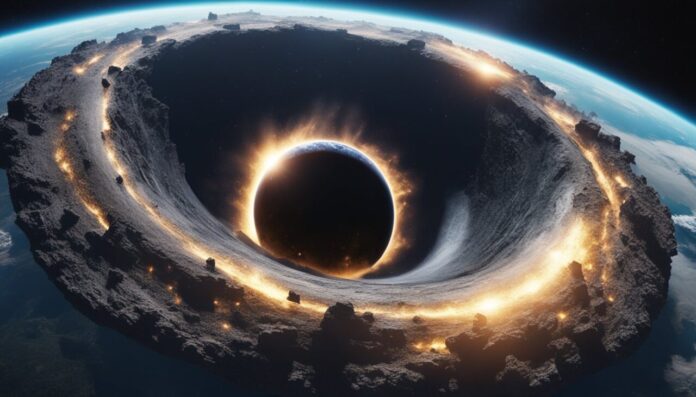
A black hole is a region in space characterized by an extremely powerful gravitational pull, preventing anything, including light, from escaping. These cosmic beasts are formed when massive stars collapse at the end of their lifecycle.
Black holes are rather fascinating, but they can also be terrifying.
And so, we’re intrigued to ask ourselves the following question: ‘What would happen if a black hole hit Earth?’
The answer is simple: Earth would be destroyed!
The gravitational pull of a black hole is so strong that it would tear our planet apart. The event horizon, which is the point of no return for anything that enters a black hole, would be just a few miles above the surface of the Earth.
Everything within that radius would be sucked into the black hole, including the Earth’s atmosphere.
The aftermath of a black hole hitting Earth would be disastrous. The debris from the planet would be flung out into space, and the black hole would continue to consume everything in its path.
For some time, at least!
Interesting fact: In theory, a black hole could continue to “eat” (accrete) matter until it reaches a point known as the Eddington limit. The Eddington limit is the maximum rate at which a black hole (or any other massive object) can accrete matter without the radiation pressure from the infalling material exceeding the gravitational attraction. Beyond this limit, the intense radiation pressure would push away the incoming material, preventing further accretion.
And even though it’s a terrifying thought, the chances of a black hole hitting Earth are incredibly slim.
To be exact – chances are around 1 in 100 billion or 0.000000001%.
That’s much less than the chances of winning a lottery. Namely, in the standard lottery (6 out of 49), chances to win are 1 in 13,983,816.
But there’s still a chance, as Jim Carey would say in Dumb and Dumber.
Yes, there are chances but so slim that it is almost impossible.
Nonetheless, it’s a rather interesting thought experiment that is worth exploring.
So, let’s start with some basics.
Note: If you’re only interested in the exact step-by-step on what would happen if a black hole collided with Earth then go directly to this section of the article.
Related:
How Many Black Holes Are There?
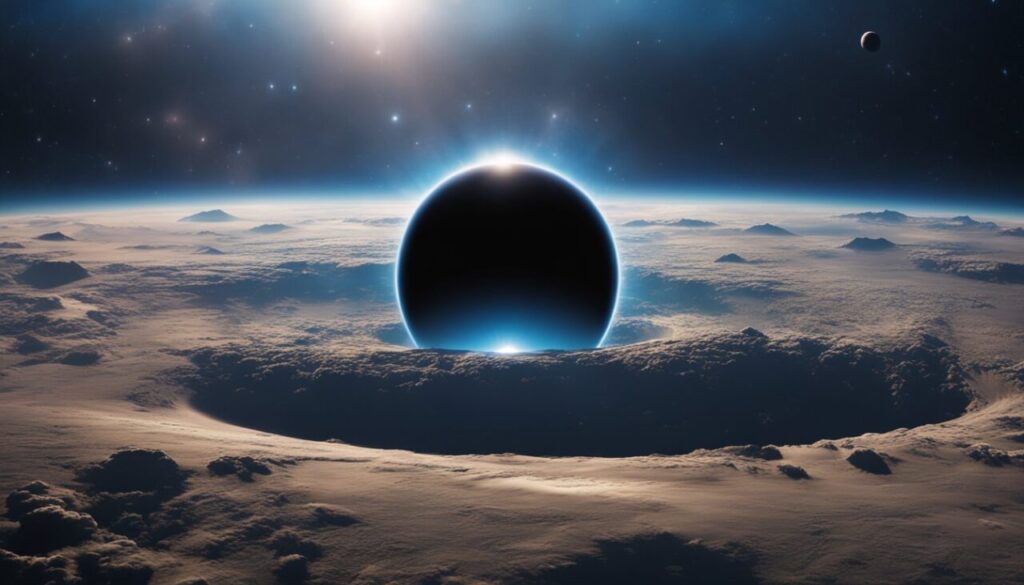
Estimating the number of black holes in the universe is a challenging task. It’s basically like counting a number of grains of sand on the beach, but even harder.
Scientists can’t directly observe black holes, as they don’t emit any light or radiation. Instead, they have to rely on indirect methods to detect them. One such method is to observe the effects of a black hole’s gravitational pull on nearby matter, such as stars or gas.
Based on these observations, scientists estimate that there are millions, if not billions, of black holes in the Milky Way galaxy alone.
And since there are billions of galaxies in the observable universe, the total number of black holes is likely to be in the quadrillions, even quintillions.
However, not all black holes are created equal. There are different types of black holes, depending on their mass.
The most common type is the stellar black hole, which is formed from the collapse of a massive star. These black holes have a mass of a few times that of the sun.
There are also intermediate black holes, which have a mass of a few hundred to a few thousand times that of the sun. These are thought to be formed from the merging of smaller black holes.
Finally, there are supermassive black holes, which have a mass of millions or even billions of times that of the sun. These black holes are found at the centers of galaxies, including our own Milky Way. Specifically, our supermassive black hole is called Sagittarius A*, Sgr A* or more simply Sagittarius A star.
And so, now that we have the basic characteristics of black holes and an estimated number of them, we need to ask ourselves the question: Is there a way to predict potential collision?
Interesting fact: Do you know why Sagittarius A* has an asterisk? Well, the asterisks are used in atomic physics to represent excited states (vs ground states) of atoms — and Sgr A* was an extremely exciting discovery!
Can We Predict the Potential Collision Between Earth and a Black Hole?
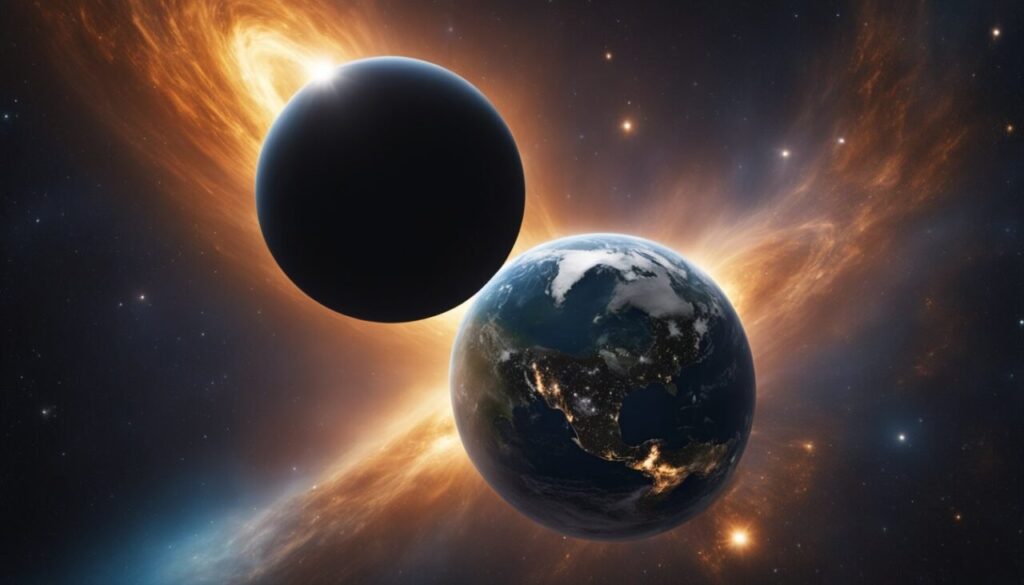
Currently, we do not have the technology to directly predict when and where a black hole could collide with our planet. However, scientists are constantly researching and developing new methods to detect black holes and their movements.
One way scientists are trying to predict potential collisions is by using gravitational wave detectors. These detectors can detect the ripples in space-time caused by the collision of two massive objects, such as black holes. By analyzing these waves, scientists can determine the location and size of the black holes involved in the collision.
Another method scientists are using is computer simulations. They can simulate the movement of black holes in space and predict their future paths. However, these simulations are limited by the accuracy of the data used to create them.
Okay, so far, so good.
Now, we have most of the parameters needed to finally answer the question asked at the beginning of the article.
Let’s first attempt to address it with a simple step-by-step model and then delve further into additional potential consequences for both Earth and the Solar System as a whole.
What Would Happen if a Black Hole Collided with Earth? – A Step-by-Step Analysis:
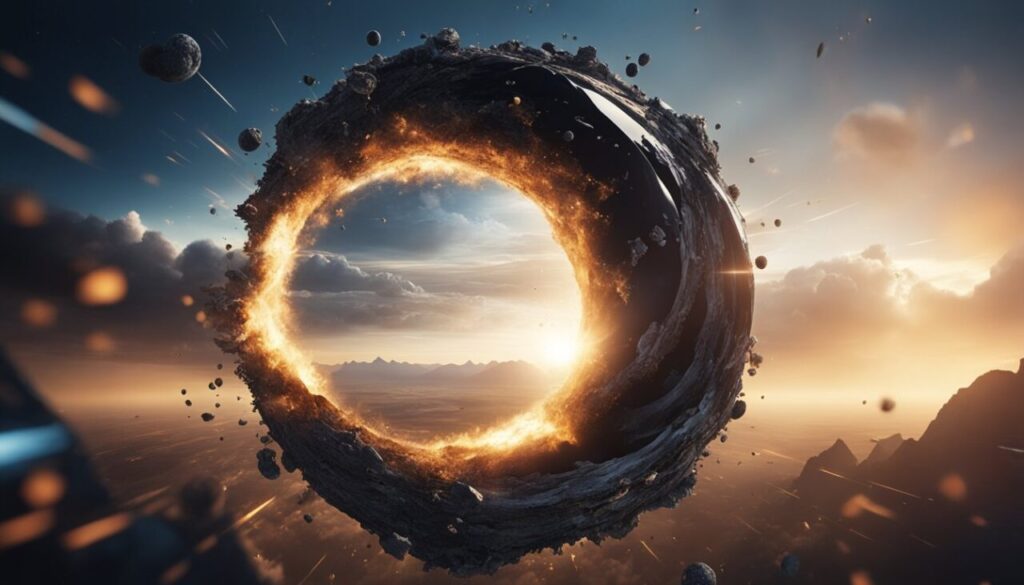
As mentioned, if a black hole were to collide with Earth, the consequences would be terrible. Here’s what would happen step by step:
- First, the black hole’s enormous gravitational pull would begin to affect the Earth from a distance. The closer it gets, the stronger its gravitational force becomes.
- As the black hole gets closer, it would begin to disrupt the Earth’s orbit and the gravitational pull of the Moon.
- Eventually, the black hole’s gravitational pull would become so strong that it would start to tear the Earth apart. The planet would be stretched (spaghettification) and compressed by the black hole’s intense gravity, causing massive earthquakes and volcanic eruptions.
- As the black hole consumed more and more of the Earth, it would create a powerful accretion disk around itself, made up of the debris from the planet. This disk would emit intense radiation and heat, making it impossible for any life to survive.
- Eventually, the Earth would be completely consumed by the black hole, leaving nothing behind but a singularity – a point of infinite density and gravity.
And so, since this is a rather terrible scenario we wonder – does Earth have some kind of protection mechanisms?
In short, kind of, but only for a little while.
Let’s see…
Earth’s Defense Mechanisms
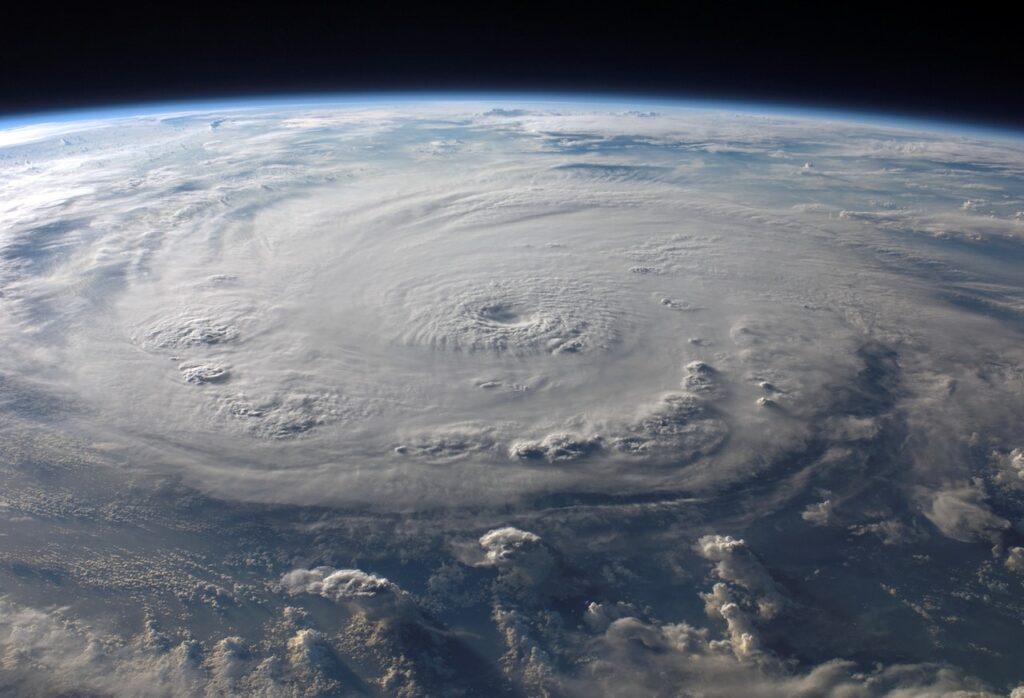
Atmospheric Shielding
The Earth’s atmosphere would offer some protection against the destructive forces of a black hole impact. Only at the sole beginning.
Namely, as the black hole approaches, it would encounter the outermost layers of the atmosphere, which would cause it to heat up and emit radiation.
This radiation would interact with the atmosphere, creating a slight barrier that would absorb some of the black hole’s energy and prevent it from reaching the surface.
However, this shielding effect would only be effective up to a certain point.
Then we also have a magnetic field.
Magnetic Field Protection
The Earth’s magnetic field would also offer some protection against a black hole impact. As the black hole approaches, it would interact with the magnetic field, which would cause it to slow down slightly and change direction. This would reduce the amount of energy that the black hole would be able to transfer to the Earth’s surface.
However, like atmospheric shielding, the effectiveness of this protection would depend on the size and strength of the black hole. If the black hole were large enough, it would overwhelm the magnetic field and cause disastrous damage to the Earth.
And so, obviously and unfortunately, Earth would be gone if a collision with a black hole were to occur.
But what about other planets and celestial bodies? Starting with our closest neighbor – the Moon?
Effects on the Moon
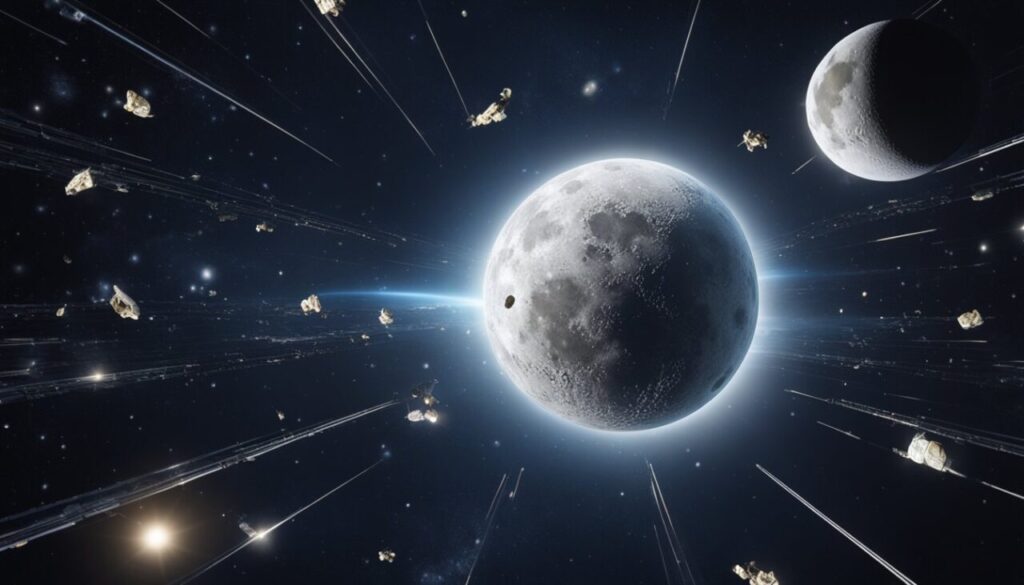
Well, the Moon would be the first to feel the effects of the black hole’s huge gravity. However, the Moon potentially would survive, depending on the size of the black hole.
Potential consequences for the Moon might include changes in its orbit, rotation, or even the possibility of being captured by the black hole.
So, let’s explore in more detail some of these consequences:
- Orbital Instability: The gravitational disruption caused by the black hole could lead to significant changes in the Moon’s orbit. This could result in a more elliptical or even a completely altered orbital path.
- Tidal Forces on the Moon: The tidal forces from the black hole could induce extreme stretching and deformation on the Moon, affecting its internal structure and potentially causing fractures.
- Roche Limit Effects: The Roche limit is the minimum distance at which a celestial body, held together by gravity, will disintegrate due to tidal forces exceeding the body’s gravitational self-attraction. The black hole’s tidal forces could push the Moon closer to or beyond its Roche limit, leading to its complete disintegration.
- Capture by the Black Hole: Depending on the specific dynamics of the collision, the Moon might be captured by the black hole, pulled into an orbit around it, or even drawn into the black hole itself over time.
- Ejection from the Solar System: In an extreme scenario, the Moon might gain enough energy from the black hole’s gravitational interactions to be ejected from the solar system entirely. Think of it as follows: if the Moon were to receive enough energy during this potential encounter, it might overcome the gravitational binding energy that keeps it in orbit around the Earth. This could result in the Moon being flung away from the Earth and, depending on the specifics of the interaction, possibly even ejected from the solar system.
So, in any case, not a really good scenario for Moon either!
But what about other planets and the solar system itself?
Post-Impact Solar System
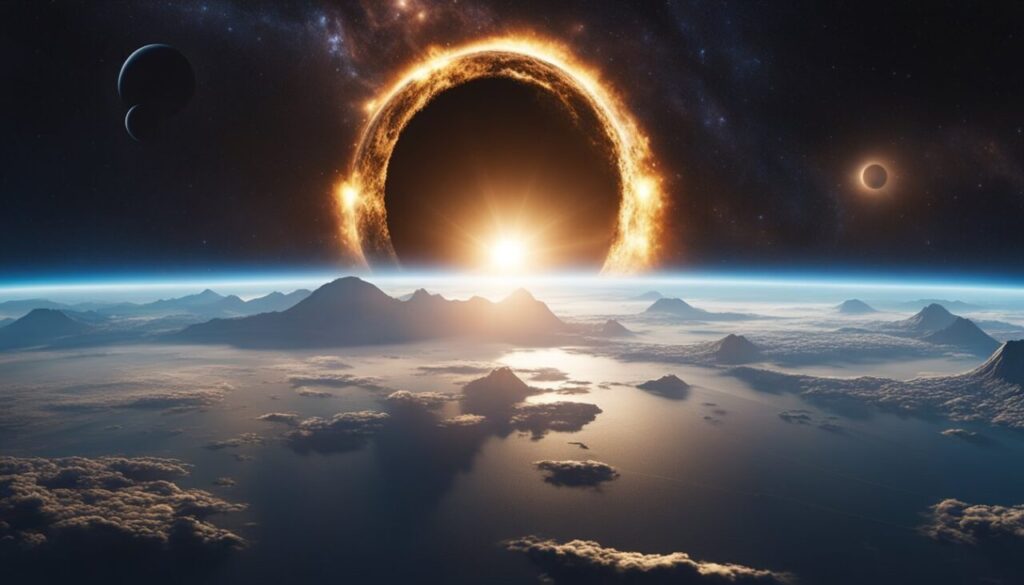
Let’s first start with other planets in the solar system.
In general, very similar things could happen as described with the Moon. As mentioned, everything would depend on the size of the black hole.
Certainly, planets farther away would be less impacted, but in the case of a really large black hole, they could be also impacted severely. Or even catastrophically!
For example, some planets could change their rotations, some might lose their moons and some might be also captured or ejected by a black hole.
Again, not a good scenario for any planet in the solar system.
In other words, if this hypothetical black hole were large enough to “swallow” the entire Earth, it would also have devastating consequences for the entire solar system.
And in the end, we must ask ourselves the following question: “Could black whole “destroy” the whole solar system?”
Well, while the word “destroy” is not appropriate in this case, as it is not scientifically correct – yes we could say that a potentially large enough black hole would be able to “destroy” the solar system as a whole.
So in this case there are potentially two scenarios: being captured by a black hole or being ejected by a black hole.
The second scenario is more likely in the case of the whole solar system.
Namely, if a black hole were to interact closely with our solar system, it could potentially lead to the ejection of some or all of the system’s celestial bodies.
The ultra-strong gravitational pull of the black hole could disrupt stable orbits and cause objects to be flung out of the solar system.
Isn’t that mind-blowing, ha?
It surely is, however as mentioned at the beginning of the article – the chances of that happening are slim to none.
Or to be exact, chances are 1 in 100 billion or 0.000000001%.
In other words, there are better chances that everybody on Earth wins the jackpot than that Black Hole “swallows” Earth!
Frequently Asked Questions
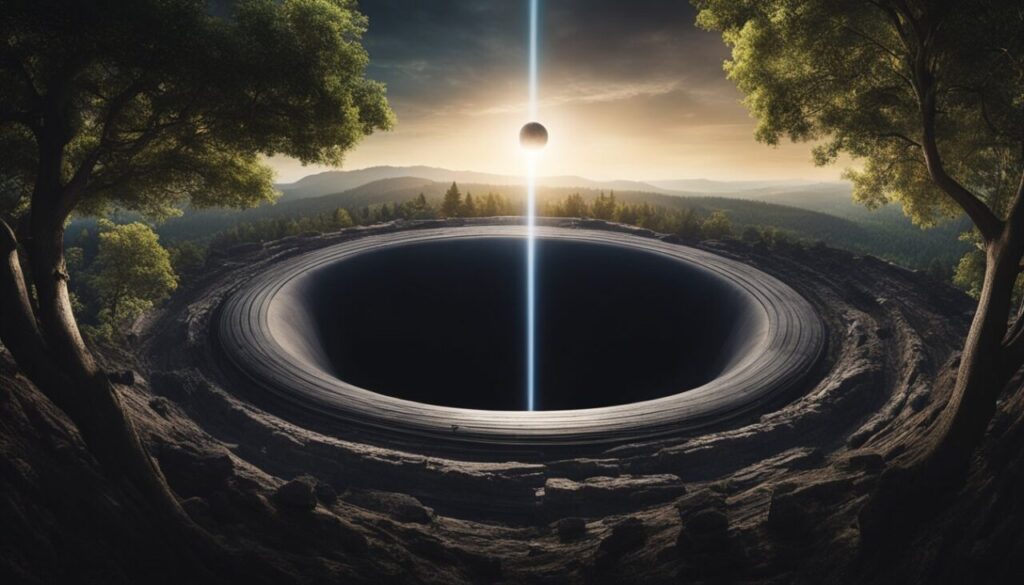
What are the potential consequences for our planet if it were impacted by a black hole?
If a black hole were to collide with Earth, the consequences would be catastrophic. The immense gravitational pull of the black hole would tear apart the planet, and the debris would be consumed by the black hole. The effect on the solar system would also be significant, as the black hole’s gravity would disrupt the orbits of other planets.
How would Earth’s orbit be affected if the Sun were replaced by a black hole?
If the Sun were replaced by a black hole of the same mass, Earth’s orbit would remain largely unchanged. This is because the gravitational force experienced by Earth would be the same, as long as the mass and distance of the black hole were the same as the Sun. However, the absence of light and heat from the black hole would have a significant impact on Earth.
What is the likelihood of Earth encountering a black hole?
The likelihood of Earth encountering a black hole is extremely low. Black holes are typically found in the centers of galaxies, and our solar system is located far from the center of the Milky Way. Even if a black hole were to pass through our solar system, the chances of it colliding with Earth are still incredibly small. 0.000000001%. to be exact.
What is the nearest black hole to our solar system?
The nearest confirmed black hole to our solar system is V616 Monocerotis, which is located approximately 3,300 light years away.
What is the expected lifespan of a black hole, and what happens when it dies?
The expected lifespan of a black hole is incredibly long, with some black holes predicted to last for trillions of years. However, eventually, all black holes will evaporate due to a process known as Hawking radiation. As a black hole emits this radiation, it loses mass and eventually disappears completely, leaving behind only radiation and particles.
Recommendation: if you enjoyed this article you might also like:




















